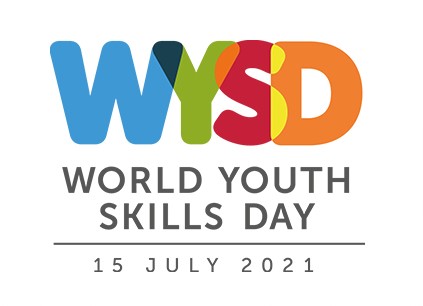Background
In 2014, the United Nations General Assembly declared 15 July as World Youth Skills Day, to celebrate the strategic importance of equipping young people with skills for employment, decent work and entrepreneurship. Since then, World Youth Skills Day events have provided a unique opportunity for dialogue between young people, technical and vocational education and training (TVET) institutions, firms, employers’ and workers’ organizations, policy makers and development partners. Participants have highlighted the ever-increasing significance of skills as the world is embarking on a transition towards a sustainable model of development.
In 2021, the World Youth Skills Day will again take place in a challenging context. The COVID-19 pandemic rages on and has reached a scale that could hardly be anticipated one year ago. Vaccination can be hoped to bring the situation under control within a few months in several high-income countries, but major emerging countries are facing severe outbreaks that overwhelm their health infrastructure. Education and training systems are yet to return to normalcy. UNESCO estimates that schools were either fully or partially closed for more than 27 weeks between March 2020 and March 2021 in half the countries of the world. In late May, 25 countries still had full school closures, affecting more than 211 million learners. And 416 million more learners were affected by partial school closures. Respondents to a survey of TVET institutions jointly collected by UNESCO, the International Labour Organization (ILO) and the World Bank reported that distance training had become the most common way of imparting skills, with considerable difficulties regarding, among others, curricula adaptation, trainee and trainer preparedness, connectivity, or assessment and certification processes.
The pandemic and lockdowns resulted in an unprecedented recession. The International Monetary Fund (IMF) estimates that the world economy contracted by 3.3 per cent in 2020 and warns that the recovery expected in 2021 – with a 6.0 growth rate – remains highly uncertain. The ILO finds that 8.8 per cent of work hours were lost in 2020, equivalent to 255 million full-time jobs. The World Bank underscores that the continuous trend toward poverty reduction observed for more than two decades was reversed – instead of decreasing by 31 million in 2020, as expected before the pandemic, the number of people living in extreme poverty increased by 93 million. The world’s poorest see both their lives and their livelihoods threatened.
Young people aged 15-24 might not risk developing severe forms of the COVID-19, yet they are particularly exposed to the socio-economic consequences of the pandemic. School and
workplace closures are leading to learning and training losses. Major life-cycle transitions are made difficult if not impossible, including graduation from general education or TVET at secondary or tertiary level, residential autonomy, and labour market insertion. Illness or death of relatives, a lack of socialization with peers, and lasting uncertainty about the end of the pandemic are impacting the mental well-being of young people. This will have durable consequences both on their personal and professional lives. Young women, youth living with disabilities, youth from disadvantaged background, and all those in informal or self-employment will have to confront the greatest challenges.
Skills development has a key part to play in fostering the resilience of young people. It is crucial for all stakeholders to ensure the continuity of skills development, especially through distance training (taking digital divides into account), to guarantee the safety of trainees and workers, and to introduce training programmes to bridge skills gaps, for instance in the health sector. Recovery plans need to guarantee funding for skills development, and to develop programmes for young people training for or employed in the most severely affected sectors. But skills development stakeholders also need to anticipate on shifts in the demand for skills in the labour market that may occur as economies shift from recession to recovery.
Reimagining Youth Skills Post-Pandemic
World Youth Skills Day 2021 will again take place in a challenging context due to the ongoing COVID-19 pandemic.
- UNESCO estimates that schools were either fully or partially closed for more than 30 weeks between March 2020 and May 2021 in half the countries of the world. In late June, 19 countries still had full school closures, affecting nearly 157 million learners. And 768 million more learners were affected by partial school closures.
- Respondents to a survey of technical and vocational education and training (TVET) institutions jointly collected by UNESCO, the International Labour Organization (ILO) and the World Bank reported that distance training had become the most common way of imparting skills, with considerable difficulties regarding, among others, curricula adaptation, trainee and trainer preparedness, connectivity, or assessment and certification processes.
- ILO estimates show that globally, youth employment fell 8.7 per cent in 2020, compared with 3.7 per cent for adults, with the most pronounced fall seen in middle-income countries. The consequences of this disruption to the early labour market experiences of youth could last for years.
World Youth Skills Day 2021 will pay tribute to the resilience and creativity of youth through the crisis. Participants will take stock of how TVET systems have adapted to the pandemic and recession, think of how those systems can participate in the recovery, and imagine priorities they should adopt for the post-COVID-19-world.

Virtual Event – 15 July 2021
On 15 July, World Youth Skills Day, join an online interactive panel discussion organized by the Permanent Missions of Portugal and Sri Lanka to the United Nations, together with UNESCO, ILO and the Office of the Secretary-General’s Envoy on Youth.
Why is World Youth Skills Day important?
In 2014, the United Nations General Assembly declared 15 July as World Youth Skills Day, to celebrate the strategic importance of equipping young people with skills for employment, decent work and entrepreneurship. Since then, World Youth Skills Day events have provided a unique opportunity for dialogue between young people, technical and vocational education and training (TVET) institutions, firms, employers’ and workers’ organizations, policy makers and development partners. Participants have highlighted the ever-increasing significance of skills as the world is embarking on a transition towards a sustainable model of development.
What role do technical and vocational education and training play?
Education and training are central to the achievement of the 2030 Agenda. The vision of the Incheon Declaration: Education 2030 is fully captured by Sustainable Development Goal 4 “Ensure inclusive and equitable quality education and promote lifelong learning opportunities for all”. Education 2030 devotes considerable attention to technical and vocational skills development, specifically regarding access to affordable quality Technical and Vocational Education and Training (TVET); the acquisition of technical and vocational skills for employment, decent work and entrepreneurship; the elimination of gender disparity and ensuring access for the vulnerable. In this context, TVET is expected to address the multiple demands of an economic, social and environmental nature by helping youth and adults develop the skills they need for employment, decent work and entrepreneurship, promoting equitable, inclusive and sustainable economic growth, and supporting transitions to green economies and environmental sustainability.
TVET can equip youth with the skills required to access the world of work, including skills for self-employment. TVET can also improve responsiveness to changing skill-demands by companies and communities, increase productivity and increase wage levels. TVET can reduce access barriers to the world of work, for example through work-based learning, and ensuring that skills gained are recognised and certified. TVET can also offer skills development opportunities for low-skilled people who are under- or unemployed, out of school youth and individuals not in education, employment and training (NEETs).
Objectives
The World Youth Skills Day 2021 will celebrate the resilience and creativity of youth through the crisis. Participants will take stock of how TVET systems have adapted to the pandemic and recession, think of how those systems can participate in the recovery, and imagine priorities they should adopt for the post-COVID-19-world. A first interactive panel will discuss skills that are need today and skills that will be need in the future, and a second panel will reflect on TVET stakeholder partnerships for scaling up youth skills development.
The objectives of the World Youth Skills Day 2021 are therefore to:
- Assess the situation of young people regarding skills and work during and after the COVID-19 pandemic; learn how they have been living through the crisis; highlight success stories of youth innovation and resilience;
- Debate on prospects for skills development and the world of work as economies recover, and on the effectiveness of national recovery plans and support from development partners.
- Reflect on how TVET stakeholders can collaborate to scale up skills development and help reconcile the short-term need for economic recovery with the urgent need for accelerating the transition to sustainable development.
Organizers
The World Youth Skills Days is co-organized by the Permanent Missions of Portugal and Sri Lanka to the United Nations, together with UNESCO, ILO and the Office of the Secretary-General’s Envoy on Youth.
BILT | New Qualifications and Competencies in TVET
The Bridging Innovation and Learning in TVET (BILT) project provides TVET institutions with a platform to explore and support the process of identification and implementation of new qualifications and competencies through an ecosystem approach.
TVET Youth Stories

As young people continue to showcase their adaptability and resilience at this challenging time, UNESCO-UNEVOC is calling on all TVET youth to submit video stories of how they are coping and continuing to learn during lockdown. These stories will be shared as part of the campaign to mark World Youth Skills Day (WYSD) and highlight the importance of skills development for a resilient youth.


